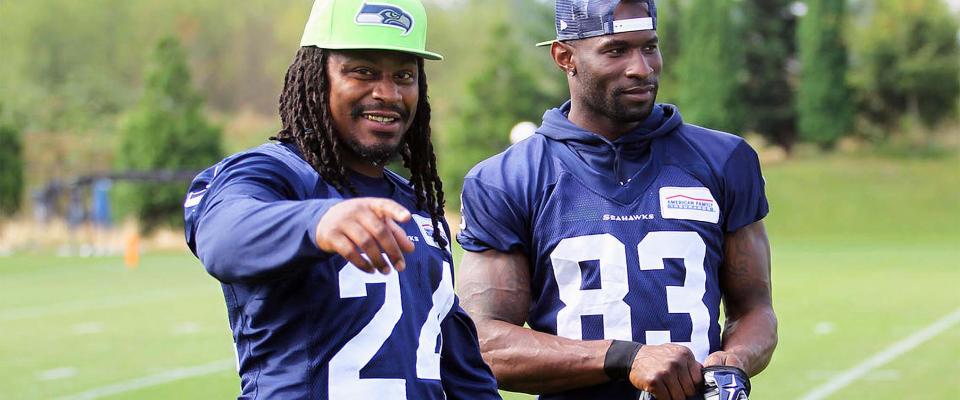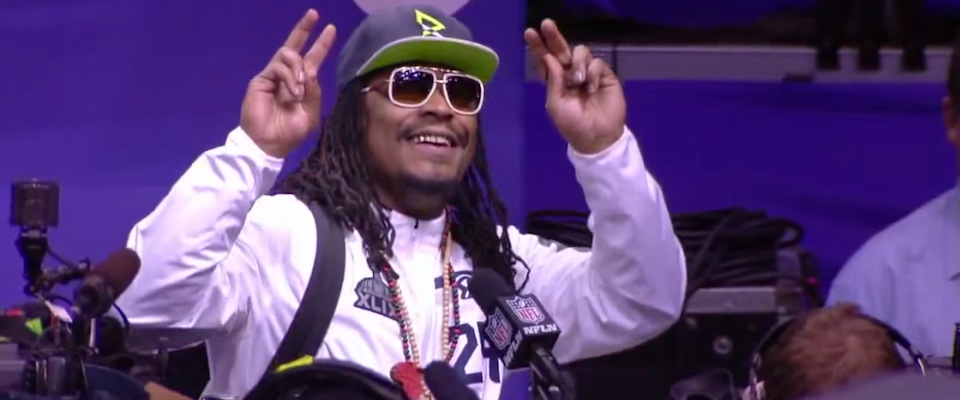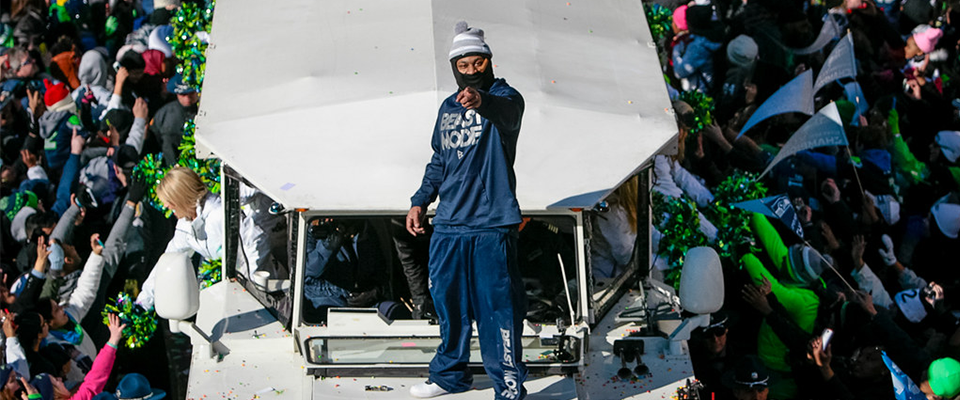Marshawn Lynch is a jerk. And he’s also a hero. He’s ungrateful, immature, and stupid. And he’s a genius with a heart of gold. Lynch, star running back of the Seattle Seahawks and former UC Berkeley phenom, is all of these things and more—if the various media portrayals are to be believed. Just don’t ask Lynch himself if any of it is true, because he’s not talking.
For the last two years, Lynch has been giving the media the stiff arm. He ducks out of locker rooms after games, clams up at press conferences, and defiantly repeats identical nonanswers to reporters’ questions. For his silence, he has been fined by the NFL and pilloried by scorned journalists. And all of this while the Seahawks have made back-to-back trips to the Super Bowl (thanks in no small part to Lynch), bringing an avalanche of media attention his way. And still, with all the bright lights and mics thrust in his face, Lynch won’t talk. And he won’t say why.
Undeterred, the sports press has stepped into the void and conjured a variety of Marshawns—everything from heel to hero, each incarnation revealing at least as much about the reporter, and the state of sports journalism, as about Lynch himself.
Lynch is known to his fans as “Beast Mode,” a nickname he earned for his powerful, relentless running style and his ability to shake defenders off like fleas. He is famous for a spectacular run made during a 2011 playoff game against the New Orleans Saints in which he broke 9 tackles on his way to a 67-yard touchdown. The fans in Seattle’s stadium erupted in such fierce celebration that a nearby earthquake sensor registered seismic activity, an earth-shaking event now memorialized as the Beast Quake.
Not only is Lynch adored by his fans in Seattle, but according to the NFL Players Association, he was the most popular running back in the entire NFL in 2014. Teammates and coaches, both past and present, have called him hardworking, fun-loving, and humble.

His fan base extends down the West Coast to his hometown of Oakland, to which he is fiercely loyal. He is well known for visiting schools and contributing to charitable causes there, including the one he cofounded with his high school teammate and San Francisco 49ers quarterback Joshua Johnson: Fam 1st Family Foundation, a mentorship program for Oakland kids. Lynch tells frustrated reporters that if they want a conversation, come see him in Oakland.
“I’ll be damned if someone from Oakland says that Marshawn don’t come back and be in his community,” Lynch told Jeffri Chadiha, an ESPN journalist who took him up on the offer. “Because that’d be a lie.”
So how did this seemingly likeable star become a media bad guy? The seeds of the dysfunctional relationship may have been sown early on. Lynch grew up poor in a rough part of North Oakland, raised almost entirely by his devoted mother. He says he became distrustful—a side effect of having an unreliable, largely absent father. “You build up numb feelings to that,” Lynch told Chadiha. “You start to expect the worst out of people.”
At Oakland Technical High School, Lynch became a local football legend and secured a full ride to Berkeley. In three seasons with the Bears, he became the second all-time career rusher and in 2006 was named Pac-10 Offensive Player of the Year.
While at Cal, Lynch was receptive to the press, says former Oakland Tribune sports columnist Dave Newhouse. “Every time I made a request for his time, he agreed, and he was very engaging whenever I interviewed him,” Newhouse says. “He’s got a good heart and was well liked by his teammates.”
In the sports blogosphere, meanwhile, a new adjective was increasingly attached to Lynch’s name: thug.
Lynch was drafted by the Buffalo Bills after his junior year at Cal, and he hit the ground running, posting 1,000-plus yards rushing in each of his first two seasons. But a few incidents off the field during those years made headlines. In 2008, he pleaded guilty to a hit-and-run violation. The following year he pleaded guilty to misdemeanor weapons possession for having a pistol inside a backpack in the trunk of his friend’s car. The NFL suspended him for three games, and sports reporters wondered whether Lynch had become a liability for the Bills.
In the sports blogosphere, meanwhile, a new adjective was increasingly attached to Lynch’s name: thug. It’s a loaded word, one his Seahawks teammate Richard Sherman spoke about at a press conference last year. “It seems like it’s the accepted way of calling somebody the n-word nowadays,” Sherman said of the epithet. “It kind of takes me aback and it’s kind of disappointing.”
When Chadiha asked Lynch how he felt about being called a thug, he said “I would like to see them grow up in project housing authorities, being racially profiled, sometimes not even having nothing to eat, sometimes having to wear the same damn clothes to school for a whole damn week. And then all the sudden a big-ass change in their life, like their dream comes true … where they’re starting their career at 20 years old when they still don’t know shit. I would like to see some of the mistakes they would make.”
Fast forward to Media Day, January 2014. For the uninitiated, Media Day is an event put on by the NFL in the week leading up to the Super Bowl. Reporters descend upon the players in swarms, asking such penetrating questions as “What kind of oil do you use on your beard?”; “What is your favorite Teenage Mutant Ninja Turtle?”; and “Which has your favorite booty: J-Lo, Iggy Azalea, or Kim Kardashian?” (I’m not making these up.) All players and coaches are contractually mandated to attend.
By this point, Lynch, a Seahawk since being traded in 2010, had established himself both as one of the top talents in the NFL and as a media mute. Weeks earlier, the NFL had fined him $50,000 for his season-long silence (fans raised the money to pay the fine) and then held the fine in abeyance pending his participation in Media Day.
“I’m just ’bout that action, boss,” Lynch famously answered. “I ain’t never seen no talkin’ win me nothin’. I’ve been like that since I was little. Was raised like that.”
When Lynch’s turn at the podium arrived, he shook off most questions fired at him; then, after six minutes, announced “I’m good,” and left. As Lynch stood quietly off to the side, CBS Sports commentator Deion Sanders approached him and asked why he didn’t like to talk.
“I’m just ’bout that action, boss,” Lynch famously answered. “I ain’t never seen no talkin’ win me nothin’. I’ve been like that since I was little. Was raised like that.”
Seahawks coach Pete Carroll was unconcerned. “I heard he did six great minutes,” he said. “Some comedians make a career off that.”
But many in the sporting press were livid. The Pro Football Writers of America released a statement that they were “extremely disappointed” in Lynch’s Media Day antics and called on the league to take action. Gregg Doyel, a national columnist for CBS News, fumed that he felt humiliated by the “stalemate of stupid.” He described the journalists’ questions as “demeaning attempts by adults to get the kid to stop acting like one.”
Sportswriter Ed Sherman wrote a column for the National Sports Journalism Center titled “Jerk Mode,” in which he called Lynch “clueless” and wrote that he “has the maturity of a 4-year-old.”
“All he has to do is mutter a few short answers, throw in a cliché or two, and he’s out the door,” Sherman wrote. “It really isn’t that difficult.”
Strangely, the column reads like an indictment of Sherman’s own profession.

“You’ve got to ask on the part of these reporters: Why bother?” says Michael Oriard, former NFL lineman and retired Oregon State English professor who has written several books on football and the media. Oriard played in the early ’70s and says this strange dance between reporters and players goes way back. “In my day, journalists were often perceived by players as intruders in the locker room,” he says. “You didn’t want to give them anything that could possibly come back to haunt you.”
Things changed with the arrival of ESPN and national televised coverage, recalls Oriard. “All of the sudden players have an incentive to be cooperative, because when you’re talking with national media for television, this could help make you a celebrity and higher paid.”
Increased cooperation has not led to increased substance, however. “The players are coached by their agents how to talk to the press because if they want endorsements, they can’t be offensive or controversial,” Oriard explains. “It’s comical to watch players absolutely refuse to give reporters anything juicy.”
On Media Day last January, reporters surrounded his podium (just one of about 20 in the room), jockeying for the best spot to hear Lynch’s nonanswers. The running back responded to every question with, “I’m just here so I won’t get fined.”
Lynch talked about his aversion to spitting out worn platitudes, in comments to nfl.com’s Michael Silver, a Cal alum and one of the few reporters Lynch seems to trust. “I’m not as comfortable, especially at the position I play, making it about me. As a running back, it takes five offensive linemen, a tight end, a fullback, and possibly two wide receivers in order to make my job successful. But when I do interviews, most of the time it’ll come back to me. There are only so many times I can say, ‘I owe it to my offensive linemen,’ or ‘The credit should go to my teammates,’ before it becomes run down.”
Although the NFL declined to fine Lynch for his 2014 Media Day performance, the battle wasn’t over. Last season, as the Seahawks marched toward a second playoff appearance, Lynch continued stonewalling and the league upped the ante, levying a $100,000 fine against him—one of the largest in NFL history.
In response, Lynch devised a new tactic. After a win against Arizona, he invited reporters to interview him in front of his locker, then answered nearly every question with one word: “Yeah.” A month later, he sat down for another postgame interview, this time politely answering every question with, “I appreciate you asking.” It made for a surreal bit of theatre, but it also fulfilled Lynch’s contractual obligation.
The Seahawks fought their way to a second straight Super Bowl in 2015, and Lynch once again found himself in the spotlight. On Media Day last January, reporters surrounded his podium (just one of about 20 in the room), jockeying for the best spot to hear Lynch’s nonanswers. The running back responded to every question with, “I’m just here so I won’t get fined.” He repeated the phrase for six minutes and left.
On day two, he switched his phrase to “You know why I’m here.” Howard Eskin, a Philadelphia sports radio personality, asked, “Marshawn, why do you have to be a jerk to all of us?” Lynch ignored the question.
“Marshawn Lynch is an American hero and a role model for anyone calling attention to bad rules and regulations every-where …”
Afterward, Eskin tweeted: “Marshawn Lynch is an idiot.”
Naturally, Lynch’s repeat performance set off a fresh wave of mouth-frothing, but this time an increasing number of commentators defended Lynch—and then some. “Marshawn Lynch is an American hero and a role model for anyone calling attention to bad rules and regulations everywhere,” wrote columnist Noah Frank.
John Randolph (aka Jay Smooth), of the popular video blog Ill Doctrine, put it this way: “For every hardworking American that knows how it feels to carry the boss’s mediocrity on your back and keep telling yourself ‘I’m just here so I don’t get fined,’ Marshawn Lynch will always be the people’s champion.”
Perhaps the most surprising defense of Lynch came from Gregg Doyel, the man who had berated Lynch the year before. In a column titled “Behold the Real Jerk in the Marshawn Lynch Story,” Doyel now wrote, “It’s lazy, to watch Marshawn Lynch—or anybody—for ten minutes and decide we know who he is. We don’t know anything about the guy. You know who does? His teammates. His coaches. And they paint a more complete picture, a picture that doesn’t always make Lynch look like a great guy, but still a picture that overall tells a different story than the ones written this week about a guy who just doesn’t like the media.”
It was a rare and admirable moment of self-reflection, perhaps a sign that writers might finally recognize Marshawn for what he is: a kid from Oakland who grew up to become one of the most thrilling athletes in the world—and one who no longer wants to play the somewhat humiliating off-the-field game the media and the league demand of him. And shouldn’t that be okay? There are more than 1,500 players in the NFL, after all. If one of them is “just ’bout that action,” reporters can go talk to someone else. Or so you’d think.
The irony, of course, is that Lynch’s silence has been one of the biggest ongoing sports stories of recent years. As the reformed Doyel wrote, “He’s writing my column for me, and I’m supposed to be mad at him? Man, I want to hug him. He’s the best.”
Freelance writer Coby McDonald, M.J. ’17, is just here so he won’t get fined.
Correction: An earlier version of this story reported that Marshawn Lynch was arrested after a 2008 hit-and-run incident. In fact, Mr. Lynch was not arrested in that incident. He did plead guilty to the charge, however, and his license was revoked.





















